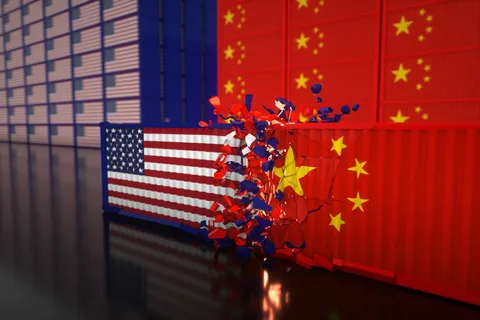US-China trade talks were at the crux of activity in Geneva this week, with China reaffirming that bilateral dialogue is beneficial in the short run but that sustainable stability in global trade could only be achieved through multilateralism. During a two-day WTO General Council meeting, representatives from China underscored that US-China trade talks are indeed moving in the right direction-but no permanent solution.
This led to a 90-day period of ceasing trade activities during which the US slashed tariffs from 145% to 30%, while China reduced its own from 125% to 10%. While markets responded positively, China made it clear that only multilateral frameworks could answer the deeper structural trade issues besetting the global economy. Thus, US-China trade talks underscored that nations should commit to transparent and cooperative systems rather than simply relying on fixes through bi-lateral measures.
Read More: LNG Trading Volumes Surge: Qatar’s Global Power Play
Tariff Truce Gives Some Breathing Space
The US-China trade negotiations in early December allayed fears of significantly agitated international markets. Actual agreement for reduction of tariffs engendered waves of hope, with indices of major stocks exhibiting gains. This 90-day period is termed “cooling period” to give both parties some more negotiations and to go back to the negotiating table. But the carrier of China’s statement in the WTO cautioned. Stating that unilateral tariff applications compared in a sense to “pouring gasoline on a fire.” Although these talks with China, however, temporarily stopped external threats. They also made clear that a global, rules-based system and not bilateralism is necessary for long-term resolution.
Multilateralism-the Way Forward
China made a reiteration of US-China trade discussions and multilateralism, thus framing the WTO General Council using that platform. “We need to find the way out-and that way is through multilateralism;” said the delegation from China. This call drew support from over 47 nations including Singapore and Switzerland. They supported the order, which was rules-based and international in law, with the WTO as lead team. US-China sufficiently highlighted that international cooperation is essential in preventing economic fragmentation. In fact, the only collective effort can bring satisfactory results for these systemic problems. Such as non-market policies and regulatory asymmetries, besides global trade imbalances.
Also Read: Al Ain Farms Group Merger Transforms UAE Food Landscape
US Stance: Reform, Not Retraction
The United States has made it clear that it also believes there were gains from the discussions held in view of China and the US. However, there is an urgent need for reform of the WTO. Treasury Secretary Scott Bessent and Trade Representative Jamieson Greer have called for multilateral restructuring of rules that “does not deal with” trade deficits or the “continuing violations” of rules.
The US-China talks have been construed as “productive;”. However, there were indications of skepticism regarding the present effectiveness of the WTO on the part of the US. While there were generally reforms expected. Major factions were reformists and others were more cooperatively inclined in terms of the future of global trade governance. Thus signifying and emphasizing yet again why continued discussions and negotiations are imperative in future US-China trade talks.
The US-China trade talks open a diplomatic window through which hope can shine, however limited. But as China has rightly pointed out, the current trade crisis cannot be resolved by hai jian shou jiang agreements. This is linked to the fact that the test here is of how far global citizens will go towards embracing a life of multilateral forms. For purposes beyond mere quick gains, but rather, for lasting global stability and prosperity.
For More Trending Business News, Follow Us 10xtimes News






